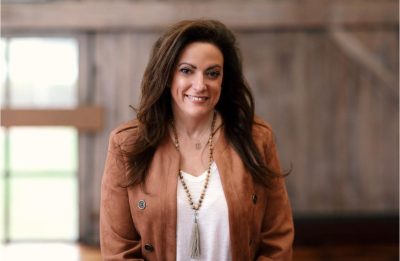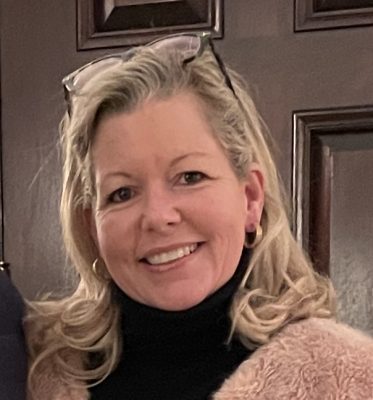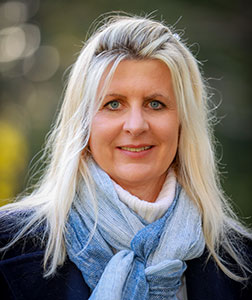Special Education, Test Scores Key Focus in Bedford Board of Ed Race
The Bedford Central Schools is one of several districts in the area that will see the retirement of one or more incumbents from the Board of Education and the certainty of new people from the community stepping forward to serve.
Current President Edward Reder has opted against running for a fourth term while member Alexandra White will also be leaving the board when the current school year ends.
Four district residents are on the ballot on Tuesday, May 16, each for the first time, to vie for the two seats: Elizabeth Goldman-Sider, Rica Mendes, Betsy Sharma and Kristine Stoker.
Voting for the election and on the district’s $152.5 million budget will be from 7 a.m. to 9 p.m. on Tuesday. Voters should go to vote at their local elementary school.
Elizabeth Goldman-Sider

Goldman-Sider decided to jump into the race because of her professional involvement with children as an academic interventionist and an executive functioning coach.
With Bedford having faced a series of challenging issues, she also thought the board could use someone with a measured approach rather than “grandstanding,” where verbal sparring has become the norm rather than civil debate, she said. Goldman-Sider also described herself as a good listener who learns by hearing others and coming to reasoned decisions.
“I thought it was important to just infuse some level of professionalism, and sort of an organizer,” Goldman-Sider said. “With what has happened in the district recently, and the budget shortfalls, it was important that somebody come – that me and Rica, we’re working together – to sort of pull everything into a more progressive motion.”
In her professional capacity, Goldman-Sider said she works with many special education students and families with special needs throughout the county. The issue has been a source of angst for many parents who have a child in the district’s special education programs.
Many families are often ill-equipped to navigate the special education landscape and what they need to do to best advocate for their child. For Goldman-Sider, the district can do a much better job at explaining to families what they face when their child is classified and how best to get the services they need.
Special education personnel almost always are people who have the best interests of students at heart, she said.
“Having said that, if that’s not the case, then we do need to bring it to the board,” Goldman-Sider said.
It also can be daunting because children can have a wide assortment of challenges that do not always result in being classified, especially since the pandemic, Goldman-Sider said. Youngsters with intellectual disabilities would get those services, for example, but there are others from unsupportive home environments or who are traumatized by bullying or having mental health needs, which districts often do not consider for special education.
Goldman-Sider said she would make sure that the needs of the special education community are met.
Goldman-Sider said she isn’t satisfied with the district’s attention to students’ mental health and well-being, although the pandemic presented unprecedented challenges. The district is trying its best and no one expects officials to have all the answers, she said. However, the pressure in many area districts, including Bedford, to succeed is so high that students are experiencing anxiety and depression.
“These social-emotional issues are highly impactful more than ever, and I do think we can do better,” Goldman-Sider said. “Getting an IEP for a child who has mental health issues is the most challenging wall I’ve had to climb in my professional experience.”
It has been pointed out by community members that Bedford is lagging in its reading and math scores, but the raw numbers fail to take in the demographics of the district, according to Goldman-Sider. With so many students either born abroad or who come from English-speaking households, it’s understandable that many would underperform their English-speaking peers in grades 3-8.
“To me it’s not a reflection of the education. These kids are learning,” she said. “But it’s a reflection of the opportunity gap in the district.”
Goldman-Sider said rather than cutting four positions in the middle school, which will increase class size next year in eighth grade, she would have liked to have seen the administration and board exhaust looking for redundancies in the district. A broader list of budget options presented to the board would also have been helpful, she said.
Although only a two-year district resident (Goldman-Sider’s children are Byram Hills graduates), she has had to fend off suggestions that she is an outsider.
“I don’t have kids in the district, and you know what that means? I have no agenda. No kid is special because every kid is special,” Goldman-Sider said.
Rica Mendes

Mendes jumped into the race in part because of the many issues facing the Bedford School District. A Fox Lane alum, Mendes was convinced by Goldman-Sider that they should team up for a run for the board. As someone who grew up in the district, it was an opportunity to help her longtime community.
One of the challenges that Mendes has had firsthand experience with was the Special Education Department, an area that received its share of criticism from many parents who currently or at one time had children in the program. Two of Mendes’ children were classified, and one of the hurdles facing special education is that it’s constantly evolving with new information and research to digest, she said.
“I think we have to be constantly overseeing it and checking it to see what the latest is and making sure that we’re keeping up to date and serving the population,” said Mendes, a hair salon owner.
That the Special Education Department has shortcomings, that is not unique to Bedford, she said. Her experience as a parent found that Bedford’s special ed program needed to improve communication and transparency with parents.
Repeated turnover in the department’s leadership may have also played a factor, but it’s not clear why there have been so many changes, Mendes said.
Speaking to faculty members, Mendes said most have agreed that the disruption from the pandemic heightened the need to address the social-emotional component and to stay on top of students’ well-being and mental health.
The district has provided increased resources for students, and it’s a situation that must still be monitored.
“I think to be blind to the mental health and safety and social issues that the pandemic brought up would be detrimental,” Mendes said. “It’s definitely something that you have to keep top of mind.”
While Mendes applauded district officials for making a decisive decision to close a more than $6 million budget gap by cutting four middle school teachers that will increase eighth-grade class size, she would have liked to have seen more exploration of other places to trim.
Mendes said the emphasis, and ensuing criticism, over the lack of proficiency of roughly half of third- to eighth-graders in the district on the standardized ELA and math exams, lacks proper context. Having a large Latin population in the district may not account for all of the underperformance but a significant amount.
“If you flip it around, the English-speaking kids, if you present them with a test, a standardized test in Spanish, they’re probably not going to perform as well as the Spanish kids,” Mendes said. “So I think we need to look at numbers like that, you can’t ignore them but I think it’s okay to put them into context, and that’s where just going by statistics is incredibly misleading and does an injustice to not only our students but the district.”
To enhance safety for teachers, staff and students, Mendes would consider increasing school resource officers provided they are properly positioned and their role is clear to the district.
“You don’t want to make a school feel like a war zone,” she said. “We want to make sure that they feel safe.”
Betsy Sharma

Raising her four daughters, now from 12 to 19 years old, Sharma has had many conversations with them about what it means to have good character and being kind, honest and trustworthy. She has stressed to her children how when someone ties their identity to their belief, it prevents them from learning from others, having what Sharma described as a “growth mindset.”
If elected to the board of education having that growth mindset and curiosity is a philosophy that would guide her.
“Focusing on the beliefs of good character, which means a truly curious person, respect for everybody, leads to a fulfilling life, and I’d like to bring that to the district,” Sharma said.
A strong school district must tend to every student’s needs, whether it be the high achiever to be challenged with rigorous academics or those in the vast middle who should be able to thrive as well.
There are also those children who are classified. Two of Sharma’s four children required special education services. The department has come under fire, and there are steps that can be taken to make sure that the confidence lost in the program doesn’t recur.
The emotion of having to place a vulnerable child in the care of somebody else and to have that trust broken is a devastating experience, said Sharma, alluding to the district’s handling of the Fox Lane High School bathroom picture-taking scandal and the ensuing Kroll report.
“Stable and effective leadership is a part of improving (the department) and the turnover has made it unpredictable, and I’m glad that the district has been willing to examine this and take action and to listen to parents,” Sharma said.
There are always challenges for students growing up and there have been no shortage of issues facing students the past few years. Sharma said she believes the district has done well in addressing mental health issues by providing resources and tackling the issue head on.
As a result of the pandemic, learning loss has been real and the district did its best to reduce class size whenever possible so students could receive extra attention. Implementation of new strategies have been welcome, Sharma said.
“I do think that the new curriculum, based on the science of reading, the board is showing a real commitment toward refining the delivery to help as many students as possible, and I know that they’ve had a new math curriculum as well,” Sharma said.
Sharma is hopeful that introducing the evidence-based Science of Reading will help make inroads into the lagging ELA and math scores in the district. Then the board needs to hear from teachers and faculty on the next steps after that along with ongoing professional development for teachers and a literacy coach to improve outcomes, she said.
“As far as English Language Learners, everybody has a right to be taught to read equally and the research shows that students do well with the Science of Reading,” Sharma said.
The choice to make cuts for eighth grade next year was an unenviable position for the board and administration. Due to a continued decline in enrollment, district officials needed to right-size staff and avoid pulling from temporary funds, she said.
Sharma pointed out that she is running independently, not with another candidate.
“I’m running my own campaign,” she said. “I’m one person who is hitting the road at 10:30 in the evening putting signs out and getting it done because I really want to serve my community as a parent and a resident of this district.”

Kristine Stoker
 Stoker had thought about running for the board previously, but knew that it was a tremendous responsibility. With two of her three children now at college, 2023 seemed to be the right time to take the shot.
Stoker had thought about running for the board previously, but knew that it was a tremendous responsibility. With two of her three children now at college, 2023 seemed to be the right time to take the shot.
“I felt that I finally had the time that I could really dedicate to the board and to do the work that is required in our district,” Stoker said.
Three key issues stand out for Stoker in this year’s board race – the $6.7 million budget gap that caused cuts for the eighth-graders’ program, lack of transparency and the poor communication from the district regarding the budget.
Stoker said she doesn’t understand why there has been such large fluctuations in the district’s finances, going from a serious deficit during in 2015, to $24 million in reserves to a more than $6 million gap that needed to balance the 2023-24 budget that will go before the voters next week.
“I am very happy that the district hired Tom Cole as the new business director, and that is a massive improvement for our district,” said Stoker, a Harvard Business School graduate who has worked in the financial end for fashion retailers and most recently in wealth management. “But I think we need more depth on the bench in this area, and I have extensive financial experience, which I can bring to the board and also add to some of that bench depth and (bring) another set of eyes, a different lens.”
Stoker was displeased that the news of the eighth-grade cuts was highlighted very late in the budget deliberations, which called transparency into question. There were also areas of the budget that weren’t even considered for cutbacks, such as administration.
The district’s lackluster ELA performance for the amount of money spent by the community means Bedford schools is getting poor value for those additional dollars spent, she said.
Stoker said the test results is clear evidence that improvements are needed. The district must also get over its “aversion to data,” she said.
“I just don’t think it’s fair in a community that has such wealth…that it should just be okay and that we don’t dig in. We have to dig in,” Stoker said. “We have to try; we have to do better, and I think that that’s the community’s responsibility.”
Furthermore, Stoker said that the Special Education Department is “in massive need of improvement.” With a son in special education, Stoker said she realized when talking to other parents that her struggles were everyone else’s struggles. Their stories made it evident to her that there was something systemically wrong with Bedford’s Special Education Department, she said.
With the anticipated appointment this week of the department’s assistant director as the new director, Stoker said she is disappointed.
“We feel like we’re not being heard,” Stoker said. “I feel like we needed to make significant change to set a new direction.”
Stoker also believed that there was no plan to make up for the pandemic-related learning loss for students. Hiring more teachers alone and putting the responsibility on their shoulders was wrong, she mentioned.
She said that diversity, equity and inclusion is vital in the district, but the best equalizer is a great education.
“As we start raising people up and start engaging the community in a more robust way, I think that would go so much further than any hundred-page report will,” Stoker said. “I think it starts with the board and the way we engage and communicate.”

Martin has more than 30 years experience covering local news in Westchester and Putnam counties, including a frequent focus on zoning and planning issues. He has been editor-in-chief of The Examiner since its inception in 2007. Read more from Martin’s editor-author bio here. Read Martin’s archived work here: https://www.theexaminernews.com/author/martin-wilbur2007/
